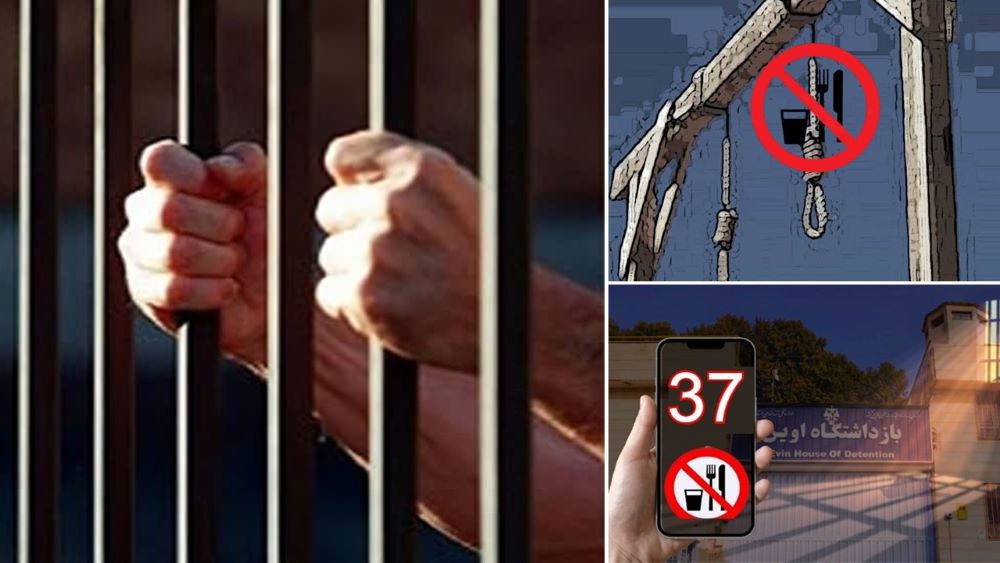
The “No to Executions Tuesdays” campaign, which has now entered its 37th week, is an organized resistance by political prisoners across 22 prisons in Iran, highlighting the country’s ongoing execution spree. The campaign’s latest statement coincided with the upcoming World Day Against the Death Penalty, calling attention to Iran’s continued reliance on executions to stifle dissent and control the population.
In early October alone, the regime executed 30 prisoners over two days, including three women. Additionally, the neglect of prisoners’ basic rights resulted in the death of Mahmoud Dahmardeh, a death row inmate who succumbed to a heart attack after being denied medical care in Zabol prison. Another political prisoner, Hamid Hossein-Nejad Haideranlou, faces imminent execution after being sentenced to death for his alleged involvement in armed resistance, signaling the regime’s escalated crackdown on dissent.
The Iranian regime, under the presidency of Massoud Pezeshkian, has intensified its use of the death penalty, with over 250 executions carried out since his term began. Despite his reformist reputation, Pezeshkian’s presidency has seen worsening human rights conditions. Since March 2024 alone, nearly 450 individuals have been executed, solidifying Iran’s position as the country with the highest execution rate globally.
The “No to Executions on Tuesdays” campaign, through hunger strikes and declarations, condemns these atrocities and calls on the international community to intervene. Political prisoners participating in the campaign stress that the Iranian regime uses executions as a tool of fear to prevent public protests and to maintain control. In response, they demand global accountability for the regime’s leaders, emphasizing over four decades of crimes against humanity.
Prominent voices, including Mrs. Maryam Rajavi, President-elect of the National Council of Resistance of Iran (NCRI), have reiterated these calls for justice. She urges the international community to hold the Iranian regime accountable for its actions, make diplomatic relations conditional on the cessation of executions and torture, and support efforts to bring Iran’s leaders to justice for their crimes.
Thousands upon thousands of Iranians have been sent to the gallows or before the firing under the mullahs. They are no longer able to feel the warmth of the sun and the energy of life.
However, as a result of their sacrifice, the dawn is near for the Iranian nation and the… pic.twitter.com/To0zRDjjih— Maryam Rajavi (@Maryam_Rajavi) October 8, 2024
Support for the campaign continues to grow internationally. Friends of a Free Iran (FoFI), a group formed in the European Parliament in 2003, also voiced its solidarity in a post on its X account. FoFI emphasized: “We have repeatedly called for an end to executions in Iran and stand in defense of the Tuesday hunger-striking prisoners.”
Furthermore, Mai Sato, the new UN Special Rapporteur on Iran, highlighted Iran’s alarming use of the death penalty in a recent message for World Day Against the Death Penalty. She noted that “over 500 executions have reportedly taken place in Iran since January 2024…” Sato joined the global call to abolish the death penalty and condemned its use as a tool of repression by the Iranian regime.
A very important message by the new UN Rapporteur for Iran.
We have also called time and again for #StopExecutionsInIran and have defended the Tuesday’s hunger striking prisoners https://t.co/SEZ0eBaMeG— Friends of a Free Iran – EP (@FOFI_EP) October 9, 2024
The persistence of the “No to Executions on Tuesdays” campaign highlights the unyielding determination of Iran’s political prisoners. Despite the regime’s attempts to instill fear, these prisoners, risking their lives, have sustained their protest, symbolizing the broader struggle for justice and human rights in Iran. This movement stands as a defiant call for global attention and action against a regime that continues to violate human rights on a massive scale.